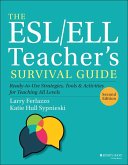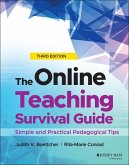The School Psychologist's Survival Guide (eBook, PDF)


Alle Infos zum eBook verschenken

The School Psychologist's Survival Guide (eBook, PDF)
- Format: PDF
- Merkliste
- Auf die Merkliste
- Bewerten Bewerten
- Teilen
- Produkt teilen
- Produkterinnerung
- Produkterinnerung

Hier können Sie sich einloggen

Bitte loggen Sie sich zunächst in Ihr Kundenkonto ein oder registrieren Sie sich bei bücher.de, um das eBook-Abo tolino select nutzen zu können.
A practical and accessible guide for helping school psychologists meet their everyday challenges In this newest addition to the Jossey-Bass "Survival Guide" series, popular blogger Rebecca Branstetter offers help for school psychologists who must often travel to multiple school sites, deal with students with severe disabilities, meet with concerned parents, and manage school crises. The book is filled with practical advice, proven strategies, and useful tools, complete with reproducible forms, letters, and checklists for busy professionals. * Filled with the tools, strategies, and ideas for…mehr
- Geräte: PC
- mit Kopierschutz
- eBook Hilfe
- Größe: 18.08MB
![The ESL/ELL Teacher's Survival Guide (eBook, PDF) The ESL/ELL Teacher's Survival Guide (eBook, PDF)]() Larry FerlazzoThe ESL/ELL Teacher's Survival Guide (eBook, PDF)24,99 €
Larry FerlazzoThe ESL/ELL Teacher's Survival Guide (eBook, PDF)24,99 €![The Online Teaching Survival Guide (eBook, PDF) The Online Teaching Survival Guide (eBook, PDF)]() Judith V. BoettcherThe Online Teaching Survival Guide (eBook, PDF)30,99 €
Judith V. BoettcherThe Online Teaching Survival Guide (eBook, PDF)30,99 €![The First-Year Teacher's Survival Guide (eBook, PDF) The First-Year Teacher's Survival Guide (eBook, PDF)]() Julia G. ThompsonThe First-Year Teacher's Survival Guide (eBook, PDF)22,99 €
Julia G. ThompsonThe First-Year Teacher's Survival Guide (eBook, PDF)22,99 €![The Classroom Teacher's Technology Survival Guide (eBook, PDF) The Classroom Teacher's Technology Survival Guide (eBook, PDF)]() Doug JohnsonThe Classroom Teacher's Technology Survival Guide (eBook, PDF)19,99 €
Doug JohnsonThe Classroom Teacher's Technology Survival Guide (eBook, PDF)19,99 €![The School Psychologist's Guide for the Praxis® Exam (eBook, PDF) The School Psychologist's Guide for the Praxis® Exam (eBook, PDF)]() Peter ThompsonThe School Psychologist's Guide for the Praxis® Exam (eBook, PDF)83,95 €
Peter ThompsonThe School Psychologist's Guide for the Praxis® Exam (eBook, PDF)83,95 €![Discipline Survival Guide for the Secondary Teacher (eBook, PDF) Discipline Survival Guide for the Secondary Teacher (eBook, PDF)]() Julia G. ThompsonDiscipline Survival Guide for the Secondary Teacher (eBook, PDF)19,99 €
Julia G. ThompsonDiscipline Survival Guide for the Secondary Teacher (eBook, PDF)19,99 €![The First-Year Teacher's Survival Guide (eBook, PDF) The First-Year Teacher's Survival Guide (eBook, PDF)]() Julia G. ThompsonThe First-Year Teacher's Survival Guide (eBook, PDF)25,99 €
Julia G. ThompsonThe First-Year Teacher's Survival Guide (eBook, PDF)25,99 €-
-
-
Dieser Download kann aus rechtlichen Gründen nur mit Rechnungsadresse in A, B, BG, CY, CZ, D, DK, EW, E, FIN, F, GR, HR, H, IRL, I, LT, L, LR, M, NL, PL, P, R, S, SLO, SK ausgeliefert werden.
- Produktdetails
- Verlag: John Wiley & Sons
- Seitenzahl: 240
- Erscheinungstermin: 23. März 2012
- Englisch
- ISBN-13: 9781118218556
- Artikelnr.: 38238175
- Verlag: John Wiley & Sons
- Seitenzahl: 240
- Erscheinungstermin: 23. März 2012
- Englisch
- ISBN-13: 9781118218556
- Artikelnr.: 38238175
- Herstellerkennzeichnung Die Herstellerinformationen sind derzeit nicht verfügbar.
Acknowledgments xix
About the Author xxi
Preface xxiii
Introduction xxv
1 Wearing Many Hats: the Roles of the School Psychologist 1
Assessment 2
Consultation 3
Prevention and Intervention 4
Counseling 5
Pulling It All Together 6
Key Points 6
Discussion Questions 7
2 Finding Where You Belong: Logistics and Building Relationships in Your
Schools 9
Getting Situated at a New School Site 11
Building Relationships with Key Staff Members 12
The School Secretary: Your New Best Friend 12
The Principal: Captain of the Ship 12
Counselors and Other Support Staff 14
Special Educators 14
General Education Teachers 17
The Custodian 17
Beginning-of-School Logistics 17
What to Do in the First Few Days and Weeks of School 18
Managing Multiple Sites 18
Finding a Work Space at Your School Site 22
Getting Needed Materials 23
Other Considerations in the First Few Weeks 23
Once You Are Settled In: Introducing Yourself 24
Introducing Yourself to Staff 25
Introducing Yourself to Families and Students 27
Pulling It All Together 28
Key Points 28
Discussion Questions 29
3 Help! I'm Drowning in Paperwork! How to Tame the Bureaucracy Monster 31
Managing Your Assessment Caseload 32
Completing Your Assessments Within Timelines 34
Check Your Assessment Caseloads for Accuracy 35
Make Your Yearly Assessment Calendar 35
Documenting and Tracking Interventions, Counseling, and Crisis Counseling
39
Documenting Interventions 39
Documenting Counseling and Crisis Counseling 39
Documenting Child Protective Services Calls and Reports 40
What's Next? Time Management Tips for Balancing Assessment Caseloads with
Other Roles 40
Scheduling Your Week 41
Scheduling Your Day 43
What to Do When You Are Drowning in a Sea of Assessments 44
Pulling It All Together 45
Key Points 46
Discussion Questions 47
4 Intervention and Prevention 49
How to Be Preventive When You Have No Time 50
Being Effective on Leadership and Prereferral Intervention Teams 50
Schoolwide Support Teams 51
Student-Focused Support Teams 53
Developing and Supporting Academic Interventions 56
Developing and Supporting Social, Emotional, and Behavioral Interventions
57
Developing Your Own Prevention Activities and Programs 59
Common Pitfalls and What to Do About Them 60
When Special Education Intervention Is the Only Game in Town 60
When Your School Is Sending You Inappropriate Referrals 61
Pulling It All Together 62
Key Points 62
Discussion Questions 64
5 Response to Intervention (RTI): Changing Your Role From Special Education
Gatekeeper to Keymaster of Interventions 65
School Psychologists' Roles in RtI 66
Academic RtI: Data-Based Decision Making 68
Tier 1 Interventions 68
Developing Individual Intervention Plans and Data-Tracking Tools 69
Behavioral RtI: Data-Based Decision Making 73
Universal Screening 73
Assessment and Intervention Audits 74
Monitoring Tier 1 Effectiveness 74
Tiers 2 and 3: Gathering Baseline Data and Using Progress Monitoring Tools
74
How to Track Individual Student Progress with Your RtI Team 75
Navigating Your Role Change 76
Pulling It All Together 76
Key Points 77
Discussion Questions 78
6 Special Education Assessment 79
The Assessment Process: From Parental Consent to Report Writing 80
Determining Timelines and Informing All Involved Parties of the Assessment
80
Reviewing the History and Gathering Environmental Data 83
Conducting a Developmental History with Parents or Guardians 89
Deciding If You Need to Do a Full Social-Emotional-Behavioral Evaluation 92
Selecting Appropriate Testing Instruments 98
Selecting Your Testing Tools 99
Beginning Your Testing with the Student 100
Writing Quality Reports 101
A Note About Other Types of Evaluations 102
Pulling It All Together 103
Key Points 103
Discussion Questions 104
7 the Individualized Education Plan (IEP): Friend Or Foe? 105
Before the IEP Meeting 106
Learning About Your Role and Presentation Style in IEP Meetings 106
Building Consensus on Your IEP Team 106
When to Share Results with Parents Before the IEP Meeting 108
Collaborating with Outside Team Members in the IEP 109
During the IEP Meeting 110
Laying the Groundwork for Presenting Results 110
Other Helpful Tips When Presenting at an IEP Meeting 117
After the IEP Meeting 118
Pulling It All Together 119
Key Points 119
Discussion Questions 121
8 Do You Have a Minute? How to Be An Effective Consultant 123
Where Theory Meets Real Life 124
Behavioral Consultation 124
Social-Emotional and Crisis Consultation 128
Academic Consultation 130
Consultation During the IEP-Writing Process 131
Dealing with Negative Nancy and Naysayer Ned: Working with "Involuntary"
Consultees 133
The Uncomfortable Teachers' Lounge Consultation 134
Pulling It All Together 134
Key Points 135
Discussion Questions 136
9 Individual Counseling 137
Counseling Roles 138
Types of School-Based Individual Counseling 139
Psychodynamic ("Insight-Oriented") Therapy 139
Play and Art Therapy 140
Cognitive-Behavioral Therapy (CBT) 142
Solution-Focused Brief Therapy 143
Beginning Counseling 145
During Counseling: Documentation and Sticky Situations 149
Documentation 149
When You Need to Call Child Protective Services (CPS) 151
When a Child Is a Danger to Himself or Others 152
Sticky Confidentiality Issues 152
Terminating Counseling 153
Pulling It All Together 154
Key Points 154
Discussion Questions 155
10 Group Counseling 157
Starting a Group: Factors to Consider 157
Conduct a Needs Assessment at Your School 158
Deciding What Type of Group to Run 158
Deciding Who Is in Your Group 159
Choosing a Cofacilitator 167
Deciding on When and Where to Hold Your Group 167
Deciding on the Level of Structure in the Group 168
What to Do When Things Get Messy 172
A Student Wants to Drop Out of Group 172
Group Members "Gang Up" on Another Group Member or Members 172
The Group Is Out of Control 173
A Student Leaves the Group Without Permission 173
A Group Member Does Not Participate 174
Pulling It All Together 174
Key Points 175
Discussion Questions 176
11 The Dreaded Late-night Phone Call: How to Deal with a Crisis at Your
School 177
Preparation for a Crisis 178
Types of Crises 179
Individual Student Crises: Danger to Self and Danger to Others 179
Schoolwide Crises: Determining the Ripple Effect and Implementing
Psychological First Aid 185
Pulling It All Together 195
Key Points 196
Discussion Questions 196
12 Put on Your Oxygen Mask Before Helping Others: How to Manage The Stress
of the Job 197
Practicing Self-Care 198
Moments of Zen 198
Flocking 199
Maintaining Healthy Work-Life Boundaries 200
Your Role and Saying No 200
Know When to Say When 202
Pulling It All Together 202
Key Points 203
Discussion Questions 203
Bibliography and Resources 205
Index 207
Acknowledgments xix
About the Author xxi
Preface xxiii
Introduction xxv
1 Wearing Many Hats: the Roles of the School Psychologist 1
Assessment 2
Consultation 3
Prevention and Intervention 4
Counseling 5
Pulling It All Together 6
Key Points 6
Discussion Questions 7
2 Finding Where You Belong: Logistics and Building Relationships in Your
Schools 9
Getting Situated at a New School Site 11
Building Relationships with Key Staff Members 12
The School Secretary: Your New Best Friend 12
The Principal: Captain of the Ship 12
Counselors and Other Support Staff 14
Special Educators 14
General Education Teachers 17
The Custodian 17
Beginning-of-School Logistics 17
What to Do in the First Few Days and Weeks of School 18
Managing Multiple Sites 18
Finding a Work Space at Your School Site 22
Getting Needed Materials 23
Other Considerations in the First Few Weeks 23
Once You Are Settled In: Introducing Yourself 24
Introducing Yourself to Staff 25
Introducing Yourself to Families and Students 27
Pulling It All Together 28
Key Points 28
Discussion Questions 29
3 Help! I'm Drowning in Paperwork! How to Tame the Bureaucracy Monster 31
Managing Your Assessment Caseload 32
Completing Your Assessments Within Timelines 34
Check Your Assessment Caseloads for Accuracy 35
Make Your Yearly Assessment Calendar 35
Documenting and Tracking Interventions, Counseling, and Crisis Counseling
39
Documenting Interventions 39
Documenting Counseling and Crisis Counseling 39
Documenting Child Protective Services Calls and Reports 40
What's Next? Time Management Tips for Balancing Assessment Caseloads with
Other Roles 40
Scheduling Your Week 41
Scheduling Your Day 43
What to Do When You Are Drowning in a Sea of Assessments 44
Pulling It All Together 45
Key Points 46
Discussion Questions 47
4 Intervention and Prevention 49
How to Be Preventive When You Have No Time 50
Being Effective on Leadership and Prereferral Intervention Teams 50
Schoolwide Support Teams 51
Student-Focused Support Teams 53
Developing and Supporting Academic Interventions 56
Developing and Supporting Social, Emotional, and Behavioral Interventions
57
Developing Your Own Prevention Activities and Programs 59
Common Pitfalls and What to Do About Them 60
When Special Education Intervention Is the Only Game in Town 60
When Your School Is Sending You Inappropriate Referrals 61
Pulling It All Together 62
Key Points 62
Discussion Questions 64
5 Response to Intervention (RTI): Changing Your Role From Special Education
Gatekeeper to Keymaster of Interventions 65
School Psychologists' Roles in RtI 66
Academic RtI: Data-Based Decision Making 68
Tier 1 Interventions 68
Developing Individual Intervention Plans and Data-Tracking Tools 69
Behavioral RtI: Data-Based Decision Making 73
Universal Screening 73
Assessment and Intervention Audits 74
Monitoring Tier 1 Effectiveness 74
Tiers 2 and 3: Gathering Baseline Data and Using Progress Monitoring Tools
74
How to Track Individual Student Progress with Your RtI Team 75
Navigating Your Role Change 76
Pulling It All Together 76
Key Points 77
Discussion Questions 78
6 Special Education Assessment 79
The Assessment Process: From Parental Consent to Report Writing 80
Determining Timelines and Informing All Involved Parties of the Assessment
80
Reviewing the History and Gathering Environmental Data 83
Conducting a Developmental History with Parents or Guardians 89
Deciding If You Need to Do a Full Social-Emotional-Behavioral Evaluation 92
Selecting Appropriate Testing Instruments 98
Selecting Your Testing Tools 99
Beginning Your Testing with the Student 100
Writing Quality Reports 101
A Note About Other Types of Evaluations 102
Pulling It All Together 103
Key Points 103
Discussion Questions 104
7 the Individualized Education Plan (IEP): Friend Or Foe? 105
Before the IEP Meeting 106
Learning About Your Role and Presentation Style in IEP Meetings 106
Building Consensus on Your IEP Team 106
When to Share Results with Parents Before the IEP Meeting 108
Collaborating with Outside Team Members in the IEP 109
During the IEP Meeting 110
Laying the Groundwork for Presenting Results 110
Other Helpful Tips When Presenting at an IEP Meeting 117
After the IEP Meeting 118
Pulling It All Together 119
Key Points 119
Discussion Questions 121
8 Do You Have a Minute? How to Be An Effective Consultant 123
Where Theory Meets Real Life 124
Behavioral Consultation 124
Social-Emotional and Crisis Consultation 128
Academic Consultation 130
Consultation During the IEP-Writing Process 131
Dealing with Negative Nancy and Naysayer Ned: Working with "Involuntary"
Consultees 133
The Uncomfortable Teachers' Lounge Consultation 134
Pulling It All Together 134
Key Points 135
Discussion Questions 136
9 Individual Counseling 137
Counseling Roles 138
Types of School-Based Individual Counseling 139
Psychodynamic ("Insight-Oriented") Therapy 139
Play and Art Therapy 140
Cognitive-Behavioral Therapy (CBT) 142
Solution-Focused Brief Therapy 143
Beginning Counseling 145
During Counseling: Documentation and Sticky Situations 149
Documentation 149
When You Need to Call Child Protective Services (CPS) 151
When a Child Is a Danger to Himself or Others 152
Sticky Confidentiality Issues 152
Terminating Counseling 153
Pulling It All Together 154
Key Points 154
Discussion Questions 155
10 Group Counseling 157
Starting a Group: Factors to Consider 157
Conduct a Needs Assessment at Your School 158
Deciding What Type of Group to Run 158
Deciding Who Is in Your Group 159
Choosing a Cofacilitator 167
Deciding on When and Where to Hold Your Group 167
Deciding on the Level of Structure in the Group 168
What to Do When Things Get Messy 172
A Student Wants to Drop Out of Group 172
Group Members "Gang Up" on Another Group Member or Members 172
The Group Is Out of Control 173
A Student Leaves the Group Without Permission 173
A Group Member Does Not Participate 174
Pulling It All Together 174
Key Points 175
Discussion Questions 176
11 The Dreaded Late-night Phone Call: How to Deal with a Crisis at Your
School 177
Preparation for a Crisis 178
Types of Crises 179
Individual Student Crises: Danger to Self and Danger to Others 179
Schoolwide Crises: Determining the Ripple Effect and Implementing
Psychological First Aid 185
Pulling It All Together 195
Key Points 196
Discussion Questions 196
12 Put on Your Oxygen Mask Before Helping Others: How to Manage The Stress
of the Job 197
Practicing Self-Care 198
Moments of Zen 198
Flocking 199
Maintaining Healthy Work-Life Boundaries 200
Your Role and Saying No 200
Know When to Say When 202
Pulling It All Together 202
Key Points 203
Discussion Questions 203
Bibliography and Resources 205
Index 207







